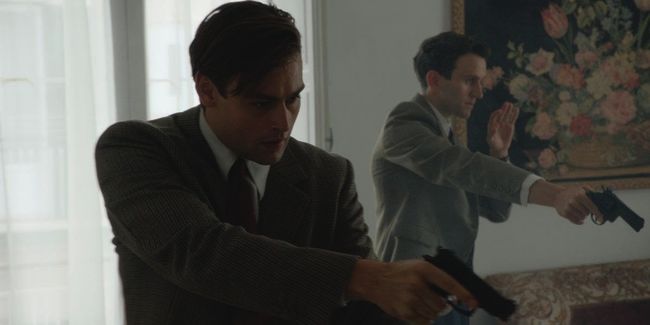Soberly relevant in light of the current Israel-Hamas conflict, filmmaker Michael Winterbottom takes us back to the pre-1948 establishment of the state of Israel and early rise of Zionist activism, as told through a love story between a Jew and a Brit. Shoshana is an ambitious project as it weaves action sequences with socio-political ideas of the era with some degree of success – greatly helped by its protagonists’ professions that allow greater insight into the region’s developing unrest.
Set in 1930s’ cosmopolitan Tel Aviv, Shoshana (Irina Starshenbaum) casually meets Englishman Thomas Wilkins (Douglas Booth) at a party, who is assigned to the Palestinian police force, and they begin an affair. Their union is doomed from the beginning as work and social alliances threaten journalist Shoshana’s wellbeing, while Wilkins investigates escalating violence against Arabs from various Zionist militant factions and puts himself in danger’s path.
At the same time the British administration and its disjointed handling of an spiralling situation becomes all the more invasive, especially when ‘old-school’ superintendent Geoffrey Morton (Harry Melling) arrives to manage Wilkins’ team. Morton is also tasked with suppressing the Jewish independence movement, in the same way he did the Arab uprising in Jenin by using brutality and mind games.
Through a series of archive newsreel, Winterbottom has narrator Shoshana bring us swiftly and neatly up to speed on the situation in the ‘present’. Daughter of a Russian Marxist Zionist, she is also a member of the Zionist paramilitary organisation Haganah that was founded in 1920 to protect the Yishuv, the expanding Jewish population in the British Mandate for Palestine.
In contrast, militant offshoot Irgun is run by elusive leader and poet Avraham Stern (Aury Alby). The police and the British authorities want to hunt down and eliminate Stern and co, before another bombing occurs. This forms the basis for the film’s tense action scenes shot in muted tones, as cinematographer Giles Nuttgens’ urgent camerawork, some from afar, is aptly edited to build a sense of anticipation and imminent peril.
It is understandable that in order to tackle the origins of such a complex political situation in the region, Winterbottom attempts to do this through the prism of an ill-fated romance. Ironically, we see little investment in Shoshana and Wilkins’ relationship, outside of clandestine meetings in the sanctuary of the police officer’s sparsely-decorated flat, or drinks by the Mediterranean coast.
In fact, portraying this union feels more like a narrative obstacle to what Winterbottom really wants to tackle here: the turbulent origins of the region. Hence, Starshenbaum and Booth’s on-screen chemistry is not convincing enough alone to infuse the story with the passion it needs. There is also one graphic sex scene that feels totally out of place because of this lack of escalated desire. Granted, Starshenbaum and Booth work with what they have, but their individual journeys in this are far more compelling.
Shoshana is actually fuelled by the spectrum of emotions between all players, from anti-Semitism and racism to love and acceptance; from Morton as Melling’s brilliantly chilling, almost sociopathic indifference to the ‘locals’, to Booth’s happy embrace of cultural practices and language. This is the real love story for a contested region of the globe. Perhaps, Winterbottom needed to be far bolder and run with this.











